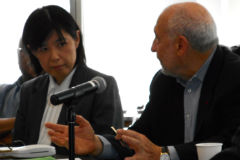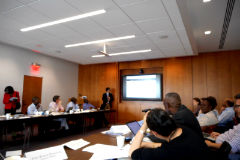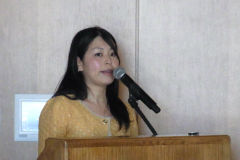Joint Research With IPD at Columbia University on 'The Quality of Growth in Sub-Saharan Africa' - First Authors' Workshop Held
2016.06.29
The first authors' workshop on "The Quality of Growth in Sub-Saharan Africa," a joint research project with the Initiative for Policy Dialogue (IPD), was held June 6 to 7, 2016, at Columbia University in the United States.
The JICA Research Institute (JICA-RI) has been carrying out joint research with the IPD, led by Nobel Prize-winning Columbia University professor Joseph Stiglitz, since 2008, and this is the fourth project we have collaborated on.
The workshop, which was co-chaired by Stiglitz, Columbia University professor Akbar Noman and Cornel University professor Ravi Kanbur, was attended by some 20 researchers and practitioners. From JICA-RI, the following people participated by giving presentations and taking part in the discussion: Deputy Director Nobuko Kayashima, Senior Research Advisor Akio Hosono, Distinguished Fellow Sakiko Fukuda Parr (professor at The New School, in the U.S.), Visiting Research Scholar Go Shimada (associate professor at the University of Shizuoka) and JICA-RI staff member Masumi Okamoto.

Deputy Director Nobuko Kayashima (left) and Columbia University professor Joseph Stiglitz
In his opening speech, Stiglitz pointed out that Africa's growth could not have happened by imitating other countries or regions, and for quality growth, not only are a transformation of its industry and economy necessary, it is also necessary to have exhaustive discussion of issues including global warming, labor issues as job creation, the development of natural resources and tourism resources, and the correction of disparities. To solve such issues, government plays an important role, he emphasized. Also, JICA - which deploys assistance in various countries based on Japan's experiences and lessons from achieving post-WWII growth - has precious expertise, he said.
Next, Kayashima, speaking about why it is important to discuss the quality of growth, pointed out that though the African economy has continued to grow well, the new problems of the disparity in education and job opportunity have also become apparent. She said the discussion in this conference could be useful for the sixth Tokyo International Conference on African Development (TICAD VI) in August in Kenya.
At the session on "Sustainable Development Goals (SDGs) and Africa" facilitated by co-chair Kanbur, Fukuda Parr indicated her recognition that while the SDGs are the result of a political agreement, it plays a significant role as a rethinking of problems in the world and a driving force toward solving those problems.
At the session on "Africa and New Global Rules for Trade, Finance and Aid," Hosono talked about the international debate going on since the 2010 Asia Pacific Economic Cooperation (APEC) forum on quality growth to bring about an economic transformation. Quality growth contributes to the realization of a learning society and an inclusive, resilient and sustainable society, he pointed out. He talked about realizing industrial transformation and growth in combination with innovation, infrastructure development and systemic development, based on cases of JICA's technical cooperation.
In a session related to "Environment/Climate and Africa," Shimada gave a presentation of the results of econometric analysis by using panel data from the World Bank and the U.N. Food and Agriculture Organization (FAO). He mentioned that natural disasters have been increasing in number every year in Africa (especially in Eastern Africa) and in particular drought is bringing serious problems. He pointed out that while natural disasters simultaneously cause growth in the agricultural production index, deforestation, and a decrease in household consumption after one year of natural disasters, they do not affect per capita economic growth. So there is a tendency to underestimate their effects.

Participants listen to Senior Research Advisor Akio Hosono
In a session on " Poverty, Inequality and Employment," Okamoto said there are multiple factors that damage mental health in Africa - including conflicts, natural disasters and economic disparities - and she warned that if measures are not taken to improve mental health, growth may stagnate because of such factors as decreased productivity and an increased risk of conflicts. A member of the audience pointed out that mental health affects initiatives on climate change and nutrition and is an important theme.
There will be two workshops, including this one, before a book is compiled and published in the first half of 2018.

JICA-RI staff member Masumi Okamoto

事業事前評価表(地球規模課題対応国際科学技術協力(SATREPS)).国際協力機構 地球環境部 . 防災第一チーム. 1.案件名.国 名: フィリピン共和国.

事業事前評価表(地球規模課題対応国際科学技術協力(SATREPS)).国際協力機構 地球環境部 . 防災第一チーム. 1.案件名.国 名: フィリピン共和国.

事業事前評価表(地球規模課題対応国際科学技術協力(SATREPS)).国際協力機構 地球環境部 . 防災第一チーム. 1.案件名.国 名: フィリピン共和国.

事業事前評価表(地球規模課題対応国際科学技術協力(SATREPS)).国際協力機構 地球環境部 . 防災第一チーム. 1.案件名.国 名: フィリピン共和国.

事業事前評価表(地球規模課題対応国際科学技術協力(SATREPS)).国際協力機構 地球環境部 . 防災第一チーム. 1.案件名.国 名: フィリピン共和国.
scroll